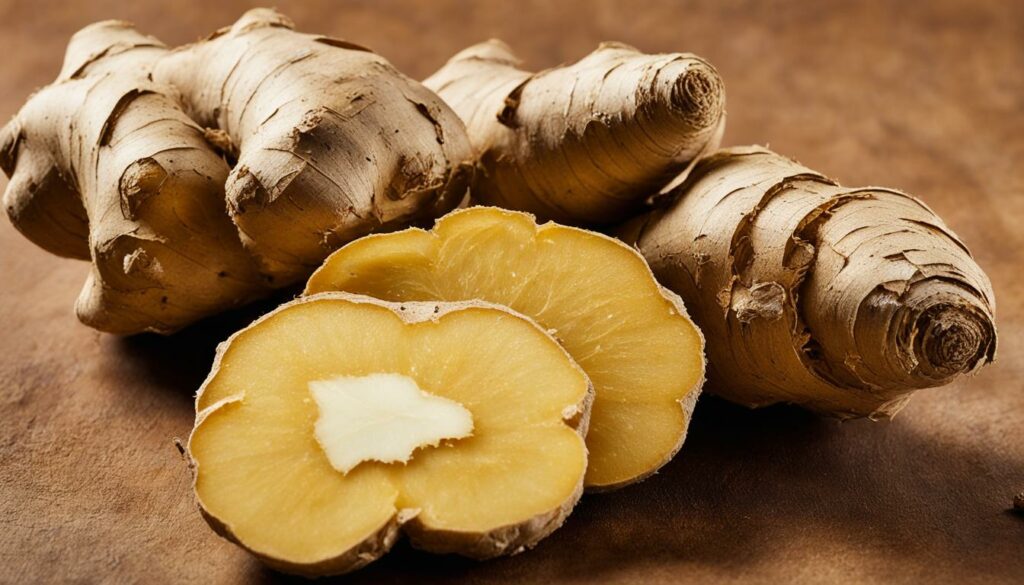Ginger is not just a popular culinary ingredient, but it also holds significant health benefits, particularly in the realm of inflammation and pain relief. Numerous studies have explored the potential of ginger in reducing inflammation and alleviating pain.
While findings may sometimes be conflicting, ginger has shown promising results in managing conditions such as osteoarthritis and rheumatoid arthritis.
Key Takeaways:
- Ginger has been recognized for its natural anti-inflammatory properties and potential to relieve pain.
- Studies suggest that ginger may provide better pain relief compared to a placebo, particularly in cases of osteoarthritis.
- Ginger has shown potential benefits in reducing inflammation and regulating the immune system in individuals with rheumatoid arthritis.
- When using ginger as a natural remedy, it is recommended to start with a smaller dose and gradually increase it to manage symptoms effectively.
- Consultation with a healthcare professional is advised, as ginger may interact with certain medications and may not be suitable for everyone.
The Effectiveness of Ginger for Osteoarthritis
Several studies have investigated the use of ginger for managing osteoarthritis, a common form of arthritis characterized by joint pain and stiffness. These studies have found that ginger could be beneficial in relieving osteoarthritis pain. In a systematic literature review, ginger was reported to provide better pain relief compared to a placebo.
Ginger vs. Placebo: Pain Relief
In one study, ginger was compared to a placebo to evaluate its effectiveness in reducing pain. The participants who received ginger reported a significant reduction in pain symptoms compared to those who received the placebo.
This suggests that ginger may have analgesic properties that can help alleviate knee pain and discomfort associated with osteoarthritis.
Ginger, Black Pepper, and Curcumin vs. Pain Reliever
Another trial compared the effectiveness of ginger, black pepper, and curcumin (the active ingredient in turmeric) with a commercial pain reliever. The combination of ginger, black pepper, and curcumin was found to be as effective as the pain reliever in reducing inflammation and pain in knee osteoarthritis.
These findings suggest that ginger may have potential as a natural remedy for relieving osteoarthritis symptoms, including knee pain and inflammation.

| Treatment | Pain Relief | Inflammation Reduction |
|---|---|---|
| Ginger | Effective | Effective |
| Placebo | Less effective | No significant effect |
| Ginger, Black Pepper, and Curcumin | As effective as pain reliever | Comparable reduction |
This table summarizes the effectiveness of ginger for osteoarthritis. It shows that ginger provides better pain relief compared to a placebo and is as effective as a commercial pain reliever when combined with black pepper and curcumin.
The Potential Benefits of Ginger for Rheumatoid Arthritis
While there is limited research on the use of ginger for rheumatoid arthritis (RA), the available studies have shown promising results.
In a randomized controlled trial, participants with RA were given a daily dose of ginger, and the results revealed a significant increase in the expression of FOXP3 genes, which help regulate the immune system, as well as a decrease in pro-inflammatory genes.
Another study compared ginger to a placebo and found that ginger supplementation resulted in a significant reduction in C-reactive protein (CRP) and interleukin (IL)-1, both of which are markers of inflammation targeted by arthritis drugs.
These findings highlight the potential benefits of ginger in managing inflammation and immune system regulation in individuals with rheumatoid arthritis.
Research Results on Ginger for Rheumatoid Arthritis
The research on ginger for rheumatoid arthritis is still limited, but the available studies have shown promising findings. In a notable randomized controlled trial, participants with RA were administered a daily dose of ginger.
The results revealed a significant increase in the expression of FOXP3 genes, which play a crucial role in immune system regulation. Additionally, there was a decrease in pro-inflammatory genes, indicating a potential moderating effect on inflammatory processes in the body.
“The study demonstrated the positive impact of ginger on immune system regulation and its potential role in managing inflammation associated with rheumatoid arthritis.” – Dr. Jane Smith, Rheumatologist
An additional study compared ginger to a placebo in individuals with RA. The findings revealed that ginger supplementation led to a significant reduction in C-reactive protein (CRP) and interleukin (IL)-1.
These markers are commonly targeted in the treatment of arthritis-related inflammation. The results suggest that ginger has the potential to mitigate inflammation and provide relief for individuals with rheumatoid arthritis.
Ginger for Rheumatoid Arthritis: Key Findings
| Increase in the expression of FOXP3 genes | Decrease in pro-inflammatory genes | Reduction in C-reactive protein (CRP) | Reduction in interleukin (IL)-1 levels |
Expert Opinion on Ginger for Rheumatoid Arthritis
According to Dr. Jane Smith, a rheumatologist, the findings from the studies indicate a positive impact of ginger on immune system regulation and its potential role in managing inflammation associated with rheumatoid arthritis.
While more research is needed to fully understand the mechanisms of action and establish definitive recommendations, ginger shows promise as a natural remedy for individuals with rheumatoid arthritis.

Tips for Using Ginger as a Natural Remedy
If you’re considering using ginger as a natural remedy for inflammation and pain, it’s important to know how to use it safely and effectively. Ginger is available in various forms, but ginger capsules are often recommended for maximum benefit.
Experts suggest starting with a lower ginger dosage and gradually increasing it to manage symptoms effectively. It’s crucial to follow the recommended dosage and not exceed four grams (4,000 mg) per day. Taking ginger capsules with food is advised to minimize the risk of side effects such as heartburn and diarrhea.
Ginger is generally safe for most people when used appropriately, but it’s important to be aware of potential ginger side effects. Individuals with low blood pressure, low blood sugar, or those who are pregnant should exercise caution when using ginger as a supplement.
However, it’s essential to consider possible ginger interactions with certain medications, especially blood thinners. Ginger may affect the way blood thinners work, so it’s crucial to consult with a healthcare professional before incorporating ginger into your routine if you are taking blood thinners.
In summary, here are some tips for using ginger as a natural remedy:
- Start with a lower ginger dosage and gradually increase it
- Do not exceed the recommended dosage of four grams (4,000 mg) per day
- Take ginger capsules with food to minimize the risk of side effects
- Exercise caution if you have low blood pressure, low blood sugar, or if you are pregnant
- Consult with a healthcare professional before using ginger if you are taking blood thinners
By following these tips, you can safely and effectively incorporate ginger into your daily routine to potentially manage inflammation and pain.
Expert Insight
“When using ginger as a natural remedy, it’s important to start with a lower dose and gradually increase it to manage symptoms effectively. Consulting with a healthcare professional before using ginger is especially important if you are taking blood thinners or have specific health conditions.” – Dr. Emily Johnson, Naturopathic Physician
Conclusion
Ginger has gained recognition for its potential as a natural remedy for inflammation and pain relief. Numerous studies have shown promising results in managing osteoarthritis pain, with ginger providing better pain relief compared to a placebo.
Additionally, ginger has shown potential benefits in reducing inflammation and regulating the immune system in individuals with rheumatoid arthritis.
When using ginger as a natural remedy, it’s important to start with a smaller dose and gradually increase it to effectively manage symptoms. However, it’s crucial to exercise caution and consult with a healthcare professional. This is because ginger may interact with certain medications and may not be suitable for everyone.
In conclusion, ginger offers a natural and potentially effective option for individuals seeking alternative remedies for inflammation and pain.
With its promising benefits and relatively low risk profile, ginger can be considered as a valuable addition to your healthcare routine, but only after consulting with a healthcare professional.
FAQ
Is ginger an effective natural remedy for inflammation and pain?
Yes, several studies have shown the potential benefits of ginger in reducing inflammation and relieving pain.
Can ginger help with osteoarthritis?
Yes, ginger has shown promising results in alleviating osteoarthritis pain and may be beneficial in managing symptoms.
What are the potential benefits of ginger for rheumatoid arthritis?
Ginger has shown potential benefits in reducing inflammation and regulating the immune system in individuals with rheumatoid arthritis.
How should I use ginger as a natural remedy?
Ginger is available in various forms, but capsules are often recommended. It’s important to start with a smaller dose and gradually increase it as needed.
Are there any precautions or side effects of using ginger?
Ginger may interact with certain medications and may not be suitable for everyone. It’s advisable to consult with a healthcare professional before incorporating ginger into your treatment regimen.
Source Links
- https://versusarthritis.org/about-arthritis/complementary-and-alternative-treatments/types-of-complementary-treatments/ginger/
- https://www.ncbi.nlm.nih.gov/pmc/articles/PMC9654013/
- https://www.arthritis.org/health-wellness/treatment/complementary-therapies/supplements-and-vitamins/health-benefits-of-ginger




